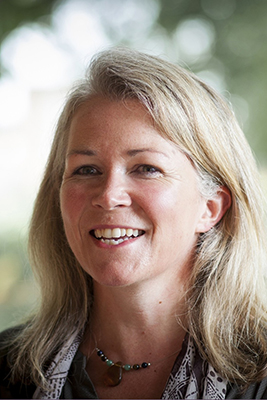Dr Ann Hill
 Position
Position
Senior Lecturer - Teacher and Community Education
Post Graduate Education Deputy Program Director
Contact details
E: ann.hill@canberra.edu.au
T: +61 2 6201 2290
L: Building 6 Room D05
Click to view Dr Ann Hill's Research profile
Biography
Dr Ann Hill’s research and teaching spans globally responsive local education futures, sustainability education and collective ethics and methods for growing more sustainable futures in professional and community settings.
Ann joined the University of Canberra in January 2017. Prior to this she was a Post-doctoral Researcher and Research Project Manager for the Australian Research Council Discovery Project ‘Strengthening Economic Resilience in Monsoon Asia’ at Western Sydney University.
At UC she is part of the leadership group of the Centre for Sustainable Communities and she co-leads the Future of food in the Canberra region research initiative . She is currently leading a research project about community co-learning through school gardening. The project examines intergenerational, socio-cultural, and personal benefits of embedding community gardening partnerships and practices in early years curriculum in Australia’s Capital Territory and is funded by the ACT Education Directorate. She also leads the Global Garden Project which is about reconnecting people with their food and with sustainable agroecology practices, to improve livelihood, health and education outcomes. Phase One of this project was a study of small-scale vegetable production practices and networks in Mindanao, the Philippines and was funded by The Australian Centre for International Agricultural Research.
Dr Hill is a Human Geographer and Diverse Economies scholar by training with specific interests in what are termed community economies and community food economies. Typically these economies centre on grassroots action to foster human and planetary survival. She is a member of the Community Economies Institute and a founding member of the Community Economies Research Network (CERN), both of which are international cross-disciplinary networks of academic and lay-researchers committed to diverse economic theory and practice. She coordinates the CERN Asia network. She is also a member of the Institute of Australian Geographers and active in the Institute’s Critical Development Studies network.
Ann graduated from The Australian National University (ANU) in 2014. Her PhD entitled “Growing Community Food Economies in the Philippines’ examines collective ethics and methods for growing different economic food futures. It focuses on community food experiments in Manila and urban Mindanao. Prior to her PhD she coordinated a large research project at ANU about community partnering for local economic development in the Philippines and Indonesia. She has over ten years’ experience in community partnering methods and in conducting empirical research for development in and across Asia and Australia.
Apart from her PhD, she also holds a Diploma of Education in Secondary Humanities Methods from The University of Sydney and a BA Honours in Human Geography from Macquarie University (BA) and The Australian National University (Hons). Her honours research conducted in 2002-03 was on community economic development in the Southern Highlands of NSW. Prior to academia she worked for ten years as a secondary school Social Sciences teacher in Sydney. During this time, she was also a student year adviser and a Higher School Certificate examinations marker for the Board of Studies. Other professional experiences have included working as a technical assistant of the University of Sydney Plant Breeding Institute, working as a nutrition consultant for Russells Health Foods, and working as a volunteer for aid NGOs Caritas and TEAR Australia. Ann has received several awards for her teaching and research including a 4-year ANU scholarship during her PhD and a Targeted Graduate Award at the commencement of her secondary schools teaching career.
Areas of expertise and interest include:
* Community engagement for development: engaging human communities in change processes through action research and asset-based community development, fostering human and nonhuman relations in community development processes
* Community food systems: community and allotment gardens, permaculture, agroecology practices, neighbourhood-based food initiatives, food security strategies for living in a climate changing world e.g. post-typhoon community container gardening in the Philippines
* Climate change adaptations and disaster responses: community-based disaster preparedness, the interface between science and social science, community and policy makers, local and global responses to climate and resource uncertain futures
* Economic geography and regional and local economic development: Diverse economies and community economies development strategies across place and scale, social and community enterprise development
* Education for Sustainable Worlds: Transdisciplinary approaches, integrating science, social science and indigenous knowledges in teaching and learning, developing post-humanist pedagogies for living in the Anthropocene
* Hybrid collective research methods: academic and lay-research collaboration, integrating science and social science perspectives particularly in relation to climate and resource issues, combining poststructuralist action research with understandings of assemblages and collective agency
* Urban geography: community resilience and transformation particularly in a climate and resource changed world, community enterprise development as strategy for livelihood re-building post extreme weather events in high density neighbourhoods, analysis of diverse livelihood opportunities in squatter settlements, feeding cities.

